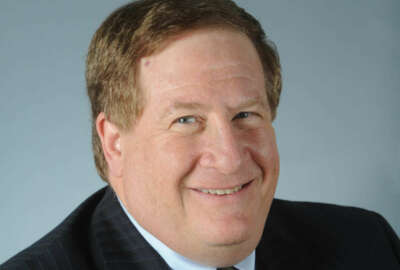

.Just a month remains in the fiscal year. And now contractors are working overtime to make those numbers. But now's not the time to make mistakes that could cos...
Best listening experience is on Chrome, Firefox or Safari. Subscribe to Federal Drive’s daily audio interviews on Apple Podcasts or PodcastOne.
The vacation season for federal contractors is over. Just a month remains in the fiscal year. And now they’re working overtime to make those numbers. But now’s not the time to make mistakes that could cost you future business or draw a protest. The Federal Drive with Tom Temin gets a few year-end do’s and don’ts from federal sales and marketing consultant, Larry Allen.
Interview transcript:
Tom Temin: Larry, with that wind-down coming, you’re giving your clients some do’s and don’ts. And your first one is don’t tell a customer an item is on contract. If it isn’t, who would do that?
Larry Allen: Tom, a lot of the things that I’m writing about this week includes this specific topic, what I would have called settled procurement science. And yet based on the feedback and input I’ve gotten from companies, just over the last month or so apparently, it’s not. And this first topic is a prime example. Apparently, lots of companies will claim that an item is on a standing contract, say a GSA schedule or another indefinite delivery, indefinite quantity contract only for the customer to find out sometimes the hard way the contractor wasn’t being 100% truthful. And that’s a problem. If you’re a contractor, you want to do year-end business. But you also have to remember that there’ll be another year and coming in 11 months from now, you want to make sure that you’re maintaining your relationships, and your image so that you can keep doing business, not just at the end of this year, but throughout all of next year and in the future. So one way to do that is to not over-promise. And part of not over-promising is not telling a customer that an item is on your standing contract if it isn’t.
Tom Temin: Right, and that runs contrary to advice that you give frequently at your end. And that is you want to help your customer by directing him or her to the right contract vehicle. And so if you send them to the right vehicle, and you’re not there, you’ve done double harm, almost.
Larry Allen: You’ve done double harm. And you’ve also done some needless harm. Tom. Look, there are often ways for contractors to quote items that are not on a standing contract, and yet offer items that are on their standing contract at the same time. A mixed proposal. A lot of times rules allow for that. You just have to clearly identify the non-contract item as being non-contract so that your customer agency can make the business decision on how they want to proceed. Do they want to accept non-contract items on this, do they like your solution overall? Are they willing to maybe do the price reasonableness analysis that they need to do for that open market portion of your offer? The bottom line is there are ways for you to stay on the right side of the customer relationship ledger here just by being open and honest and saying hey, you know these 10 items that you want, I have eight of them on contract, but these two aren’t, I can get them for you. And I’m authorized to sell them, but they’re not on my contract. A lot of times the customer is going to say, Okay, that looks good.
Tom Temin: All right. And then your second “don’t do”, is don’t sell through companies you’ve never heard of.
Larry Allen: Yeah, Tom of the three topics that I’m writing about this week, this is the one that really surprises me. And surprises me because just last week, I had a company come to me and say, “Hey, we’ve got this firm that we’ve never heard of, and they apparently want to bid that includes our items. What do we do?”, and my advice was, don’t sell through companies that you don’t have a standing business relationship with. The bottom line, Tom is that the company that called the firm that ended up touching base with me, were out offering something for sale that they had no business offering for sale. They had no relationship with the EOEM, they had no letter that allowed them to be a reseller. They just said, Hey, you know, here we see, in this case, it was a state, a very large state, this state wants a lot of this equipment, let’s go ahead and bid on it. They won the bid. And then they turned around to the contractor and said, you need to supply us with that item, because we won. And my advice is never do business with a company like that. Look, you might be able to get that one piece of business with the state. But you don’t know this company’s reputation. You don’t know whether they’ve got people that might be proposed for suspension or debarment, for example, you know, whether or not they’ve got other business issues, whether their credit is worthy. Stick to the companies that you have established business relationships with. And if you had a company that bid something of yours that shouldn’t have, chances are you’ve got a reseller or maybe your own internal capability to reach out to that customer agency and say, hey, look, here’s what happened. We’re happy to fulfill the order and get it for you the right way.
Tom Temin: We’re speaking with Larry Allen, president of Allen Federal Business Partners. Yeah, because you don’t want people that could sully your reputation because of something you don’t know about theirs. And then with respect to dealing with customers, you’re telling folks don’t try now for that introductory meeting. This is not the time to get acquainted with a new customer.
Larry Allen: It really isn’t. And it’s not that most federal customers don’t want to talk to you. I’ve certainly found over the course of my career that as a general rule, federal agencies like having interactions with contractors. They want to have an understanding of what the newest market offerings are, what are the trends in the commercial sector, things of that nature. But there’s a time and a place for everything Tom and time for those discussions is not now when buyers are busy trying to get projects they’ve already got committed for this year out the door. That’s true at the end of every federal fiscal year. But it’s particularly true this year, when Congress passed the appropriations bill six months late, we really compressed the time for agencies to get those new acquisitions out the door, to get the new items, get the new project started. So that’s what those customers are busy doing now. There’ll be time in November and December, and even really, through next April, or May, to have those introductory discussions, the “what’s new for the 2023 model year” type of discussions, but trying to get those meetings now is just going to identify your company as one that doesn’t really understand the market dynamics of the market that they’re trying to sell into, and potentially upset somebody that you really don’t want to upset. There’ll be time for those introductory meetings later. And that also goes for trying to initiate discussions with new industry partners, too. So your industry partners, they’re out busy trying to sell in those businesses as well, they might like to hear from you about what your latest solution is, what your new capabilities are. But that has to wait until the after the end of the fiscal year as well, Tom. And it will come. In the meantime, do business the best way you can and realize that, you know, if you don’t get it for this busy season, do the things you’re supposed to do, you’ll be able to be in good position for next year.
Tom Temin: And you do have one “do do” for federal contractors. And that is know what your sales force is actually telling customers because everybody’s desperate to make those numbers at the year end, and salespeople, well, you just need to know what they’re saying.
Larry Allen: Tom, that’s exactly right. And I don’t mean to pick on salespeople. Where would we be without salespeople? Salespeople are an important part of government business. And you rely on good salespeople to make sure that your company has a good reputation, is reaching out to the customers you want them to reach out to. However, it’s certainly been my experience that sometimes salespeople will over-promise, they want to get the commission in, they want to get the business in by September 30. And more than once that’s led to some, let’s say creative things that the contracts department then has to either find a way to make work, or they have to go back to the salesperson and say no, we can’t do it this way. And then the salesperson has to do the last thing that any salesperson wants. And that’s to go back to the customer and say, hey, that thing I told you we could get done for you, turns out, we can’t. Nobody wants to hear that. It’s better for the salespeople to be coordinating with contracting, coordinating with marketing to make sure that everybody in the company has the same message and understands just what the capabilities are.
Tom Temin: And I guess you could say the reverse is true. If you’re on the government side, now’s not the time to ask for the impossible because everyone’s dealing with the same year-end rush.
Larry Allen: Well, I think that’s exactly right. If you’ve got a real specialty need, or a real specialty requirement that’s coming down the line, now is probably not the best time to hit up your favorite contractor with it. Will contractors try to be responsive, you bet they will. But you probably are going to be limiting your options, because very few companies will have the bandwidth to commit new resources to a complex requirement here at the end of August. So if you’re looking for something innovative, that’s gonna get you good competition, maybe the time to do that is later, although if you want to start something as a pilot because you need to commit the funds, and we all know that we’re going to start next year under a continuing resolution. Starting something at least in a pilot capacity this year, that’s not a bad way to go either.
Tom Temin: Larry Allen is president of Allen Federal Business Partners.
Copyright © 2024 Federal News Network. All rights reserved. This website is not intended for users located within the European Economic Area.
Tom Temin is host of the Federal Drive and has been providing insight on federal technology and management issues for more than 30 years.
Follow @tteminWFED




